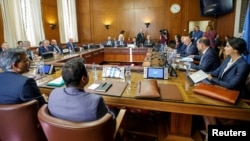As the United Nations is working with local and international stakeholders to draft a new Syrian constitution, Syrian women demand a seat at the table to ensure their concerns and insights are considered in a future Syrian state.
The demand for women's participation comes amid a renewed international push for intra-Syrian negotiation to end the country's seven-year-war.
Stakeholders are discussing formation of a committee that would oversee the drafting of a constitution.
"It is crucial for women to be part of the making of the constitution,” Rima Flihan, a Syrian writer and human rights activist based in Australia, told VOA. If they aren’t, “there will not be real guarantees for their rights in the legislative process in the future."
Flihan said the constitution would be the basis for all future legislation and a female presence is crucial in writing it to safeguard the rights of all Syrians, including women and minorities.
Some analysts said having women represented in politics will have long-term positive effects.
Rachel Dore-Weeks, acting deputy director and adviser on peace and security for Arab states for the U.N. Women organization, told VOA that female participation in the peace process has statistically been proven effective elsewhere and Syrian stakeholders should not ignore women in the country's politics, including in discussions about the constitution.
"We know statistically, through empirically sound data, that there is a direct, positive correlation between a more diverse and more represented peace process and the durability of the peace that is brokered," Dore-Weeks said. If women are engaged, she said, "they are more likely to get to the peace table and get people to talk to each other, and the peace agreement will more likely be brokered and more likely to last."
Some Syrian women, however, said the political discussions are not Syrian-led or Syrian-owned, as different actors, states and groups are leading them.
'Meaningless'
"At this point, women's participation in writing the constitution is meaningless. I don't agree with the way that the constitution is currently being written. The situation in Syria is unstable and will not permit for a fair and full participation of all Syrians, including women and minorities, in writing the constitution," Azza Al Bahra, a Sweden-based Syrian journalist, told VOA.
"Only when real regime change takes place, and refugees go back home, then we will have an effective political process," Al Bahra added.
Nisreen Trabulsi, a U.K-based Syrian analyst, echoed Al Bahra's concerns.
"In my opinion, Syria is under occupation from different parties, and the people are unable to voice their real aspirations," Trabulsi said. "The current process of writing the constitution is illegitimate."
Staffan de Mistura, the U.N. special envoy for Syria, has recently stepped up his efforts to reignite the political process in Syria before the end of his tenure this year, and drafting a new constitution for the country is one of his goals.
De Mistura was supposed to leave his post this month, but he has extended his tenure at the request of U.N. Secretary-General Antonio Guterres as part of efforts to keep the momentum going toward formation of a constitutional committee.
This month, de Mistrua met with U.S. Secretary of State Mike Pompeo to discuss the constitutional committee, and the U.S. reiterated its support for the U.N.-led efforts in Syria "under the auspices of U.N. Security Council Resolution 2254," the State Department said.
The peace process in Syria is proceeding through parallel channels: the U.N.-led Geneva process that is supported by the United States and Europe, and the Astana process that is led by Russia.
The late Kofi Annan, when he was U.N. envoy to Syria, began the Geneva process in June 2012. He presented a six-point plan that called for an end to fighting and the initiation of an "inclusive Syrian-led political process to address the legitimate aspirations and concerns of the Syrian people."
The Astana process began in 2017, with delegations from the Syrian government and opposition groups meeting to discuss peace. This track, spearheaded by Russia, with Turkey and Iran as parties to it, has led to creation of four de-escalation zones in Syria. The Syrian regime controls all zones except for Idlib.
The Astana agreement prevented a major military offensive on Idlib, which is one of the last rebel strongholds in Syria and home to several militant groups with tens of thousands of fighters.
The fragile deal has survived and prevented warring sides from waging full-scale war, but many analysts warn it will not withstand the pressure of competing interests and priorities of different local and international stakeholders.




